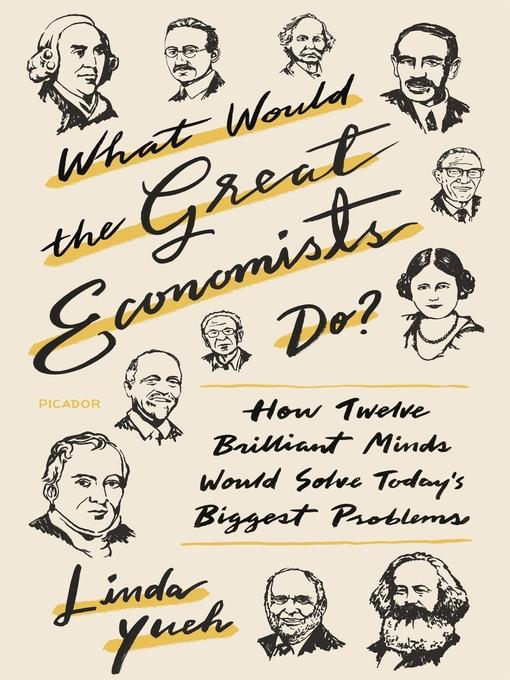
What Would the Great Economists Do?
How Twelve Brilliant Minds Would Solve Today's Biggest Problems
کتاب های مرتبط
- اطلاعات
- نقد و بررسی
- دیدگاه کاربران
نقد و بررسی

March 12, 2018
An appealing thought experiment—what if the great economic thinkers of the past took on today’s most intractable problems—supplies the premise for this provocative work from economist Yueh (China’s Growth). Unfortunately, Yueh’s answers are less stirring than the question, principally because her subjects’ work has already been absorbed into mainstream economic thinking. She devotes much of the book to profiles of her “great economists,” among whom she includes Milton Friedman, John Maynard Keynes, Karl Marx, and Adam Smith, and while the compressed biographies are sometimes helpful with understanding their ideas, they more often distract from the book’s exploration of contemporary issues like income inequality and the role of central banks. Elsewhere, Yueh is more on point, as in the chapter on Joan Robinson (an overlooked female economist), who studied why wages do not necessarily rise in economic recoveries. The epilogue addresses the future of
globalization and invokes the thoughts of the greats (largely arguments for free trade), but feels tired and less than revelatory, suggesting that the modern world would be better served by looking for the next great economist than by looking to the past.

May 1, 2018
Invisible hand, meet trickle-down: a lightly learned but deep-reaching look at classic economic problems through the lens of classical economics.Business schools across the land teach a set of canonical precepts: The free market is good and self-correcting, corporations have the sole duty of maximizing return for shareholders, and commerce is indifferent to larger matters of ethics. But are all those points true? Also, are they useful in addressing obdurate problems that seem custom-coined for our time, such as, in the face of economy-must-grow models, the future seems the province of low productivity and lower expansion? Enter BBC broadcaster and Oxford economist Yueh (China's Growth: The Making of an Economic Superpower, 2013, etc.), who turns to Robert Solow, "the author of the workhorse of economic growth models," for guidance. She also goes against Solow and on to the ground of endogenous growth theory but returns with a humane prescription: Just as Solow located growth in, among other things, how workers are treated, maybe we can learn to retool. (Yueh adds that Solow, still at work in his 90s, also counsels relaxing some: "learning to adjust, to adapt, is not a bad thing for economists to learn.") And what of quantitative easing in recessive economies? Well, throw Keynes into the mix, then see what Milton Friedman would say about whether increasing the monetary supply is the right thing to do. Concludes Yueh, with sidestepping befitting a careful economist, "it's fair to say the jury is largely still out." The author, who once ran for Congress as a kind of made-for-TV thought experiment, has solid, interesting things to say about globalization, human capital, and kindred matters and a correct sense for which economist to bring to the problem at hand, whether Paul Samuelson ("the last of the great general economists") or Alfred Marshall, the anti-socialist who still supported redistribution--with qualifications.A pleasure for the fiscally minded and a good introduction to applied economics for readers with a smattering of theory.
COPYRIGHT(2018) Kirkus Reviews, ALL RIGHTS RESERVED.

Starred review from May 15, 2018
Few economics books are able to address major problems, present leading and sometimes conflicting theories, and be accessible to the casual reader. Yueh (China's Growth, 2013) takes current issues affecting today's global economy and attacks them through the eyes of a dozen leading economists, from the historic (Adam Smith) to the modern-day (Robert Solow), clearly applying their work to modern problems. Each chapter presents the ideas of one leading economist, with a lengthy biography that discusses both his or her personal and professional path. It then applies his or her theories to a single contemporary issue. The economists selected cover a wide range of economic and political philosophies, from John Maynard Keynes and Milton Friedman to Karl Marx and Joan Robinson. Issues presented are equally wide ranging, from financial crises and government regulation to wage earnings and growth rates. A final chapter addresses globalization and current reactions to it, including Brexit and Trumpism; Yueh surmises how all 12 economists would respond to this topic and introduces yet another great economist's ideas, those of Paul Samuelson. This book is readable, informative, and thought-provoking, and deserves a place in all libraries.(Reprinted with permission of Booklist, copyright 2018, American Library Association.)

























دیدگاه کاربران